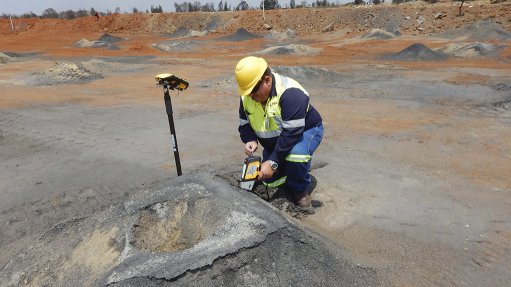
MINERAL POTENTIAL South Africa’s reserves of key minerals are still high, but that it will take a long time to unlock them
Owing to low overall business confidence, year-on-year mining production declining by more than 4% and volatility across all mineral commodities, the explosives industry has remained relatively undynamic, says explosives and blasting company BME commercial marketing GM Ralf Hennecke.
The current state of the explosives industry mimics that of the mining sector in general, as it is driven by mining production output, he says.
“The main contributors in the decline of the mining industry are the gold, diamonds and platinum group metals sectors. The areas of opportunity for explosives suppliers going forward lie in the technology and services domain areas. This is a global phenomenon.”
Hennecke explains that mines are starting to place more emphasis on mine-cycle optimisation, real-time reporting and data mining for blasting trend analysis, blast design optimisation and blast outcome predictions.
Subsequently, the company has automated a large part of its explosives production facilities to enhance the consistency and quality of end-products. This assists in running longer and more consistent production cycles, which ultimately decrease product and mining input costs.
“Although the South African narrow-reef and deep-level mining industry is still not suited to total mechanisation and/or automation, mechanisation is preferable for underground mining,” he comments.
Further, BME is continuously working on new software and technology developments. This includes its revolutionised underground charging equipment, real-time reporting mechanisms and improved product ranges, Hennecke tells Mining Weekly.
The company is focused on technology improvements, digitalisation strategies, and product enhancements that will lead to mine production improvements and blast optimisation in general.
BME has commercialised many technology products over the past few years, including improved centralised electronic blasting systems, fit-for-purpose underground pumping equipment and technologies, the imminent new generation electronic detonators, as well as software blast design and reporting equipment.
“We offer blast optimisation strategies and service packages that optimise mill throughput. BME has been successful in using increasingly more waste oil in its emulsion formulations, driving down costs and assisting clients in the environment-friendly disposal of waste oil from their operations,” Hennecke affirms.
As a division of diversified chemicals company Omnia Group, BME fully supports and is committed to the South African mining industry. It aims to partner with key stakeholders in the industry, align with new ownership and be a significant player in community upliftment and localisation programmes.
Additional focus on corporate social investment opportunities, community assistance and localisation programmes is needed. This needs to happen sustainably without compromising mining, and mining-related activities and efficiencies, Hennecke points out.
“We can achieve this by leveraging knowledge to the local market. BME always aspires to operational excellence, and partnering clients using world-class products, services and technologies.”
Meanwhile, he states that South Africa’s reserves of key minerals are still high, but that it will take a long time to unlock them, owing to the long-lead cycle between exploration, mine development and actual production.
“With foreign direct investment down, investor confidence eroding, infrastructure constraints, and ever-increasing mining input and utility costs, there are few prospects of new mining operations unfolding. This limits the explosives market,” he concludes.